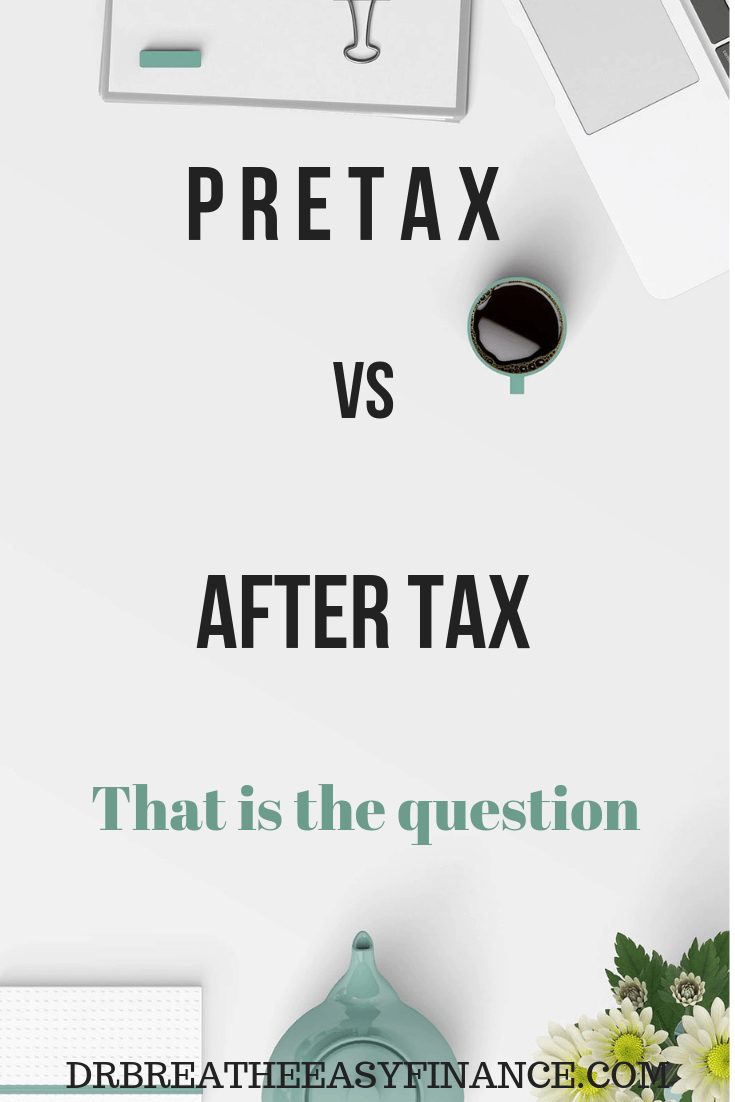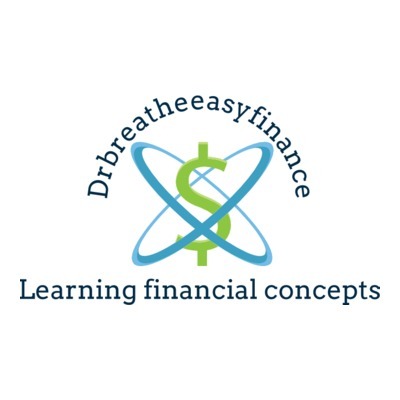I get this question constantly, whether to invest pretax vs after tax. Obviously, the answer is to do both if you can. However, some want to really nail it down to which one to invest in first or prioritize. This is important if funds are limited for example, while in training.
Benjamin Franklin said,
Nothing is certain in life except death and taxes.
I couldn’t agree more. Ultimately, there is no way to avoid paying tax. However, the secret of the rich is learning how to pay taxes strategically.
Paying tax is inevitable with the exception of a few types of savings accounts with triple tax advantages.
If you understand the tax code, then you can modify your contributions and spread your assets. This way, you will come out ahead.
Let’s review the ways we pay taxes using examples. You will then be able to see why I prioritize different investment vehicles.
I will give the examples of the triple tax advantage accounts at the end of this post.
Table of Contents
Short answer
It depends on your tax bracket right now and what tax bracket you predict you would be in the future.
Do both if you can afford to do so.
Now for the long answer. I enjoy going through the calculation. I hope you enjoy it too.
In this article we will discuss
-
Pretax retirement account with an example – 401k
-
After tax retirement account with an example – Roth IRA
-
Peak earning year variations to the above example
-
Taxable account and why you should prioritize 401k and Roth first.
-
Briefly touch base on short and long capital gain
-
Tripe tax advantage accounts.
Numbers don’t lie right? So let’s bring out the calculator and get this done. Below are some examples of tax scenarios that will help us out.
Note that these calculations are based on lots of approximations. However, you will get the main idea.

Pin me! Pin me!! Pin me!!! to Pinterest
Scenario 1.
Pretax retirement investment
You invest the money before it is taxed
Then you pay tax when you withdraw the money.
Examples of these types of investment accounts are 401k, 457 and any deferred compensation plan.
Let us use 100,000 dollars investment for example, invested over a period of 30 years pretax with an average annual growth of 10%.
I use 10% a lot because the average annualized total return for the S&P 500 index over the past 90 years is 9.8 percent. Truth is, it is easier on the eye and makes the numbers look awesome.
Know that you might not get this, but with properly balanced portfolio, the consensus is that you can achieve 8% average if you invest over a long horizon. 30 years horizon is the optimal amount of years.
We will also assume a 30% effective tax rate.
Why did I pick 30%? Its semi random and close to my current tax rate.
After 30 years
Principal = $100,000
Interest amount = $1,883,739
Maturity value = $1,983,739
Then you are taxed on the maturity value. We will assume a tax rate of 30%.
Net value = $1,388,617
After all is said and done, you have close to 1.4 million dollars. Not shabby.
If you are lost after the first calculation. Check out these former posts below
Everything you need to know about 401k
Time value of money, demonstrating the compound interest wonder
Now let us go through the next scenario.
After tax retirement investment
You invest your money that has already been taxed
Your money grows tax free
Then withdraw the money tax free
A common example of this is the Roth IRA.
Click below for post on Roth IRA
How long will it take to become a millionaire with Roth IRA
Using the same assumptions of 30% effective tax rate and 10% growth on average per year,
You pay the 30% tax on $100,000
Principal = $70,000
Interest amount = 1,318,617
Maturity value = 1,388,617.
Interestingly, we arrived at the same number if you pay the money pretax or pay the tax after.
The caveat to the above
You lower your taxable income when you contribute into pretax investment account, which means you get immediate benefit in your high earning years. Your marginal tax bracket is also likely to be higher during your peak earning years.
In essence, it is still better to maximize all pretax investments you can find during your peak earning years as your marginal tax bracket would be high.
When you retire, you are likely going to be in a much lower income tax bracket. Let’s use 30% for simplicity since many doctors are high income earners.
For example, let’s do the calculations again using different tax brackets which are more realistic.
Peak earning years variation
At your peak earning, let’s say your marginal tax bracket is 37% – the maximum federal tax rate after the Tax Reform. So, if you make 700,000 dollars taxable income a year for example, after $600,000, your federal tax rate on the rest would be 37%. So you want to invest that 100,000 and you have a choice to invest it pretax or after tax.
Pretax Scenario
In 30 years
Principal = $100,000
Interest amount = $1,883,739
Maturity value = $1,983,739
Now chances are that you will have a lower income tax in retirement, or higher if the tax law change.
Let’s say your tax rate is now 30%
So after tax, net value = $1,388,617
After tax scenario
$100,000 – (37% tax)
In 30 years,
Principal = $67,000
Interest = $1,186,756
Maturity value = $1,249,756
In this case the pretax account beats the Roth IRA (the after tax individual retirement account)
Of course, this is the perfect case scenario for pretax account. If tax is increased in the future, then you would have had a better advantage with the after tax account.
So think carefully! Weigh the pros and cons. Regular 401k vs Roth
Taxable account
You can invest the money after tax
Then pay tax on the interest when you withdraw
Example is the taxable account.
Using the same example above,
You pay the 30% tax now on $100,000
Principal = $70,000
Interest amount = 1,318,617
Maturity value = 1,388,617.
You only pay tax on the interest amount in taxable account. Thankfully, in this case, you either pay long-term capital gains or short-term capital gains
You will pay short-term capital gains if you hold your investment for less than a year. This will not apply to you because you are smart. You will keep your investments for long horizon. Short term capital gains are taxed just like your ordinary income.
Here is the difference in taxation for short-term and long-term capital gains.

Back to our calculation, I will use married and filing jointly because that’s what I am.
You need to pay tax on 1,318,617. If you are taxed at 15% capital gain.
After taxing interest, the remaining value = 1,120,824
Net = 1,120,824 + 70,000 = 1,190,824
As you can see, this is less than both of the retirement accounts. This is the reason why most financial savvy people advise to utilize your retirement accounts first.
Triple tax advantaged accounts
Having discussed the above, now lets get into the fun part. This is the part where you can eat your cake and have it at the same time.
Health savings account
To do this, you have to be at least a toddler of finance. But I will discuss about it briefly.
To utilize a HSA, you will need to enroll into a high deductible health insurance. This has its advantages and disadvantages. For one, if you will require a lot of medical care that year, you might end up paying more for your healthcare versus if you have just stayed with the low deductible plan.
To qualify, apart from having a high deductible plan, you must fulfill the following criteria too.
- Make sure you are not covered under another health insurance plan, including Medicare coverage, with certain exceptions.
- You cannot be claimed as a dependent on someone else’s tax return.
Your HSA dollars can be used to help pay the health insurance deductible and qualified medical expenses, including those not covered by the health insurance, like dental and vision care.
For more information, Here is a link for you.
http://www.hsacenter.com/how-does-an-hsa-work/
You can contribute pretax, you can then invest your HSA money and use it for medical expenses without paying tax at all. Cool right!
The HSA have been called the stealth IRA by many because of this.
If you think the IRS is giving you free lunch, you must be day dreaming. The catch is this, if you withdraw your HSA for non-qualified medical expenses, you will be taxed at your normal income-tax rate, in addition to 20% penalty if you’re under 65.
Partial triple tax advantage
529 plan
A 529 plan is a tax-advantaged savings plan designed to encourage saving for future education costs. If you live in states that offered state tax deduction, then you can turn this into a triple tax advantage , at least state tax wise. You can use the vanguard tool to see if your state qualifies and also compare with another state. Here is a link below.
You can open the account in any state you want, but you might not be eligible for tax savings if you do not open the account in your state.
There are some reasons to use another state plan which for me is the expense ratio of the funds in the investment available. We will likely talk about 529 plan by itself in the future so I will leave it for now.
Below is another link to learn more about 529 plans.
https://www.sec.gov/reportspubs/investor-publications/investorpubsintro529htm.html
I hope you learned something. If you do, please subscribe for weekly newsletter and comment below.
What do you think? Which one do you prioritize?
I am a pulmonary and critical care doctor by day and personal finance blogger/debt slaying ninja by night.
After paying off close to $300,000 in student loan debt in less than 6 months into my real job, I started on a mission to help others achieve the same. There is no magic to this than to strap up and get it done. Some of the ways we achieved this include side hustle, budgeting, great negotiation skills, and geographical arbitrage.
When I was growing up, common knowledge in Nigeria is that there is one thing you cannot trust anyone else with, and you guessed it – your money.
Being frugal came easily to me based on my background. However, the concept of building wealth did not solidify in my mind until when I finished medical school. I wish I knew what I know now when I was 14. Still, I don’t know enough and I am constantly learning to improve my knowledge.
My goal is to reduce financial illiteracy among young professionals. I am catering to the beginners – babies and toddlers in financial literacy.








yorkshiremumof4 says
This is a great post, I wish I could understand it more as I love personal finance. Totally interested in investments but knowing where to start is difficult. I wasn’t aware we could do pre tax investments, is that just a US thing?
admin says
The pretax here is usually through a retirement account. It is an incentive for people to save and invest. To start, try a variation of blogs and books. If still having difficulty, then try a fee only advisor to start. Once you are savvy enough, you can fire him or her.
Alice V-DIYerfy says
These are some good points to think about when it comes to saving for retirement. And saving in general
admin says
Thanks for commenting. I am glad the article was useful. Saving and retirement planning is necessary but not everyone do it.
Shyla Elza says
This is definitely something I need to learn about as I have been pondering about my 401k. Thank you for sharing.
admin says
Thanks for stopping by. 401k is one of the good stuff we have in this country. Deferring tax and also getting a match. Double win.
TheFrugalFrenchie (@AFrugalFrenchie) says
I would consider myself ace at saving, but investing still scares me so much. Even the idea of buying stuff to resell- even if I know there’s a worthwhile profit margin- still scares me. Will definitely bookmark this for when I’m feeling braver though!
Annelies | https://thefrugalfrenchie.co.uk
admin says
I get where you are coming from, investing could be daunting. However, just like most things, a leap of faith is all it takes. Think about the alternative.. which is to keep your money in the bank and it will become worthless with inflation. Thanks for stopping by.
jamnesreen says
You always have the most informative posts!
admin says
Thank you very much.
BringingHowToBack says
Unfortunately so many people in this country lose sight of the benefits of retirement savings. Both pre and post-tax savings have their own differences in advantages but I’m a firm believer that there is no con to either. Any money saved is a good thing and that’s what’s important. Thanks for keeping us thinking and on our toes regarding finances! I’m definitely in the pretax savings boat, but I think diversification is also great!
Adebayo says
You are absolutely right. in the personal finance space, we just enjoy the banter and the nitpicking. Thanks for stopping by.